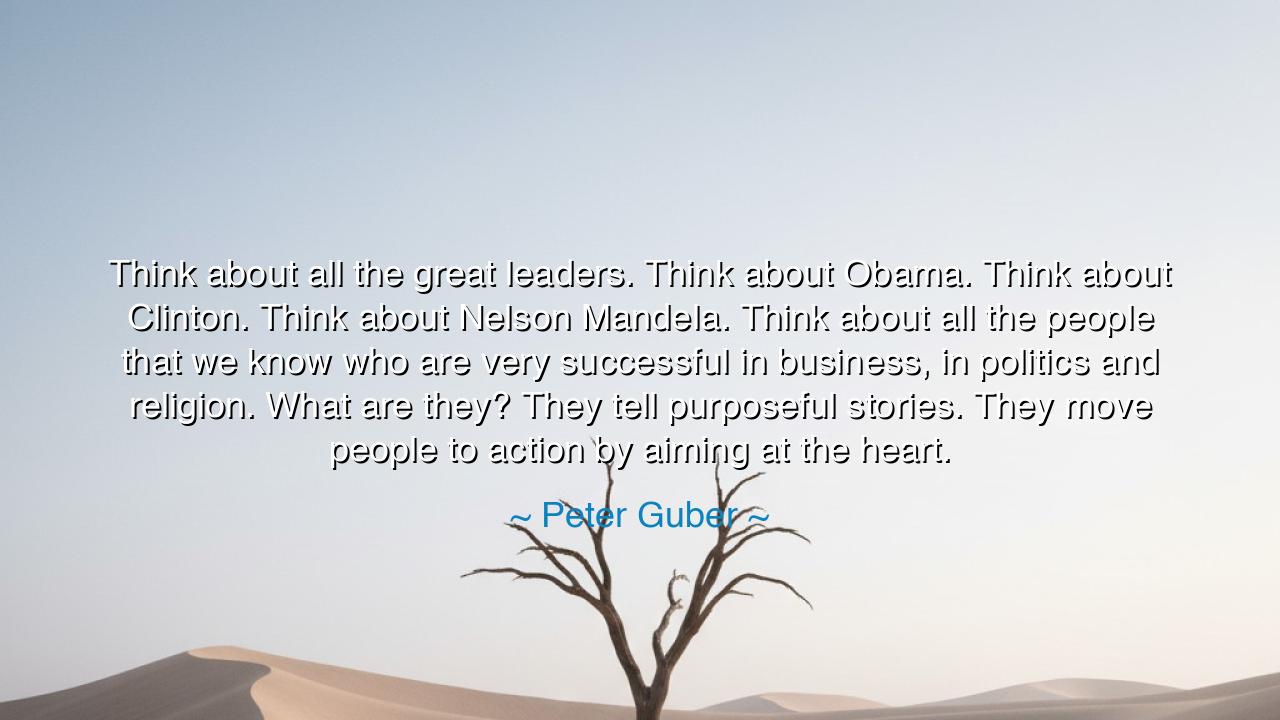
Think about all the great leaders. Think about Obama. Think about
Think about all the great leaders. Think about Obama. Think about Clinton. Think about Nelson Mandela. Think about all the people that we know who are very successful in business, in politics and religion. What are they? They tell purposeful stories. They move people to action by aiming at the heart.






The words of Peter Guber—“Think about all the great leaders. Think about Obama. Think about Clinton. Think about Nelson Mandela. Think about all the people that we know who are very successful in business, in politics and religion. What are they? They tell purposeful stories. They move people to action by aiming at the heart.”—are a hymn to the ancient and eternal power of storytelling. They remind us that leadership is not merely the craft of policy or command, but the art of stirring the soul. Guber reveals that the thread binding together prophets, presidents, and visionaries is not their strategy alone, but their ability to wield words as fire, shaping the imagination of their people and guiding them toward a shared destiny.
The origin of this reflection lies in Guber’s life as a producer and storyteller, one who understood that human beings are moved less by data than by meaning, less by the mind alone than by the union of mind and heart. He looked to leaders such as Obama, whose speeches painted pictures of hope and unity; Clinton, whose charisma wove narratives of possibility; and above all, Nelson Mandela, whose very life was itself a story of suffering turned into triumph. From them, he drew the truth that leadership and storytelling are inseparable.
History itself confirms this eternal lesson. Consider Winston Churchill, who in Britain’s darkest hour raised not armies but words to rally his nation. “We shall fight on the beaches,” he declared, and his people believed, not because the words described the battlefield, but because they gave voice to courage. Or think of Martin Luther King Jr., who did not merely outline policies for equality, but told a dream—a dream so vivid that it still moves the hearts of millions decades later. These leaders prove Guber’s point: to aim at the heart is to awaken the will of a people.
Yet this truth is older still. The ancients knew that heroes did not live only in deeds but in stories that were sung and told from generation to generation. Homer’s Iliad and Odyssey were not mere poems, but the very fabric of Greek identity, teaching courage, loyalty, and endurance. The Hebrew prophets did not deliver lectures, but spoke in parables and visions that stirred nations. Even the teachings of Jesus were not given as cold doctrine, but as stories—the prodigal son, the good Samaritan—parables that live on because they strike the deepest chords of the human heart.
The wisdom here is clear: facts may inform, but only stories transform. A statistic may tell us what is, but a story shows us what can be. Leaders who master this art do not merely command obedience; they awaken belief. They bind communities together not by force, but by shared imagination. To aim at the heart is to awaken the fire of purpose, the courage to act, the hope to endure. Without story, leadership is hollow; with story, leadership becomes immortal.
The lesson for us is powerful: do not underestimate the force of your own story. Whether you lead a nation, a business, a family, or your own life, the way you frame your struggles and hopes shapes how others follow you—and how you follow yourself. Ask not only, “What do I know?” but “What story do I tell?” For in that story lies the power to move hearts, and when hearts move, the world follows.
Practically, this means learning to tell your story with purpose. Reflect on your life, on the struggles you have endured, on the victories you have gained. Find the threads of meaning that can inspire others. Speak not only to the mind but to the heart—use images, emotions, and lessons that stir action. Listen to the stories of others, too, for leadership is not only telling but weaving, binding together the narratives of many into one greater tale.
Thus, Peter Guber’s words shine as both revelation and challenge: great leaders tell purposeful stories, and those stories move people to action. Let us then be mindful of the stories we tell, for they are not merely words, but seeds planted in the soil of human hearts. And when such seeds take root, they grow into movements, into revolutions, into legacies that outlast even the teller.






AAdministratorAdministrator
Welcome, honored guests. Please leave a comment, we will respond soon